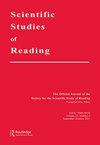From Bibliophile to Sesquipedalian: Modeling the Role of Reading Experience in Vocabulary and Reading Comprehension
IF 2.4
2区 教育学
Q1 EDUCATION & EDUCATIONAL RESEARCH
引用次数: 4
Abstract
ABSTRACT Purpose We investigated the roles of leisure reading and word reading ability in vocabulary and reading comprehension development in 598 adolescents at ages 10, 11, and 12 (285 girls, 313 boys). Method Structural equation modeling was used to test whether word reading was associated with vocabulary and reading comprehension: a) directly; b) indirectly via leisure reading; or c) both. Results We found both direct and indirect effects of word reading on vocabulary: word reading ability directly predicted outcomes, and also predicted the amount of leisure reading, which in turn predicted vocabulary. For reading comprehension we observed direct but not indirect effects of word reading. As expected, vocabulary and reading comprehension outcomes were strongly correlated. Conclusion Our findings demonstrate the direct effect of word reading ability in predicting vocabulary and reading comprehension, and reveal a crucial mediating role of leisure reading in the development of vocabulary.从爱书人到阅读爱好者:阅读体验在词汇和阅读理解中的作用
摘要目的我们调查了598名10岁、11岁和12岁的青少年(285名女孩,313名男孩)的休闲阅读和单词阅读能力在词汇和阅读理解发展中的作用。方法采用结构方程模型检验单词阅读是否与词汇和阅读理解相关:a)直接相关;b) 间接通过休闲阅读;或c)两者。结果我们发现单词阅读对词汇的直接和间接影响:单词阅读能力直接预测结果,也预测休闲阅读量,休闲阅读量反过来预测词汇。对于阅读理解,我们观察到单词阅读的直接而非间接影响。正如预期的那样,词汇和阅读理解结果之间有很强的相关性。结论我们的研究结果证明了单词阅读能力在预测词汇和阅读理解方面的直接作用,并揭示了休闲阅读在词汇发展中的重要中介作用。
本文章由计算机程序翻译,如有差异,请以英文原文为准。
求助全文
约1分钟内获得全文
求助全文
来源期刊

Scientific Studies of Reading
Multiple-
CiteScore
7.20
自引率
2.70%
发文量
26
期刊介绍:
This journal publishes original empirical investigations dealing with all aspects of reading and its related areas, and, occasionally, scholarly reviews of the literature, papers focused on theory development, and discussions of social policy issues. Papers range from very basic studies to those whose main thrust is toward educational practice. The journal also includes work on "all aspects of reading and its related areas," a phrase that is sufficiently general to encompass issues related to word recognition, comprehension, writing, intervention, and assessment involving very young children and/or adults.
 求助内容:
求助内容: 应助结果提醒方式:
应助结果提醒方式:


